Michelle Graham and Oscar Horta: Outlook on the emerging field of wild animal welfare research
By EA Global @ 2020-10-25T06:56 (+13)
This is a linkpost to https://www.youtube.com/watch?v=_U537I75-XU&list=PLwp9xeoX5p8OoBBqv8t7JhVcgbjtXq3f7&index=26&t=881s
In this EA Student Summit 2020 talk, Michelle Graham of the Wild Animal Initiative and Oscar Horta of Animal Ethics discuss the wide variety of research areas relevant to wild animal welfare, the career and educational pathways related to conducting this research, and how you can support the field.
Below is a transcript of Michelle and Oscar’s talk, which we’ve lightly edited for clarity. You can also watch it on YouTube.
Michelle's talk
Sofia Davis-Fogel (Moderator): Hello, and welcome to this session on the emerging field of wild animal welfare research with Michelle Graham and Oscar Horta. I'm Sofia Davis-Fogel, and I'll be the emcee.
We'll start with a seven-minute talk by Michelle, followed by a six-minute talk by Oscar. Then we'll move on to a live Q&A session where they will respond to some of your questions.
Michelle is the Executive Director of Wild Animal Initiative, a nonprofit research and advocacy organization dedicated to understanding and improving the lives of wild animals. She's also pursuing a PhD in comparative biomechanics at Virginia Tech. She previously studied physics and philosophy at the University of Oxford, and has worked as a teacher and as a veterinary receptionist.
Michelle: Today, I'm going to talk about advancing wild animal welfare by working in adjacent communities, or as I like to call it, “playing nice with others.” Before I begin on that topic, let me outline briefly what wild animal welfare actually is.
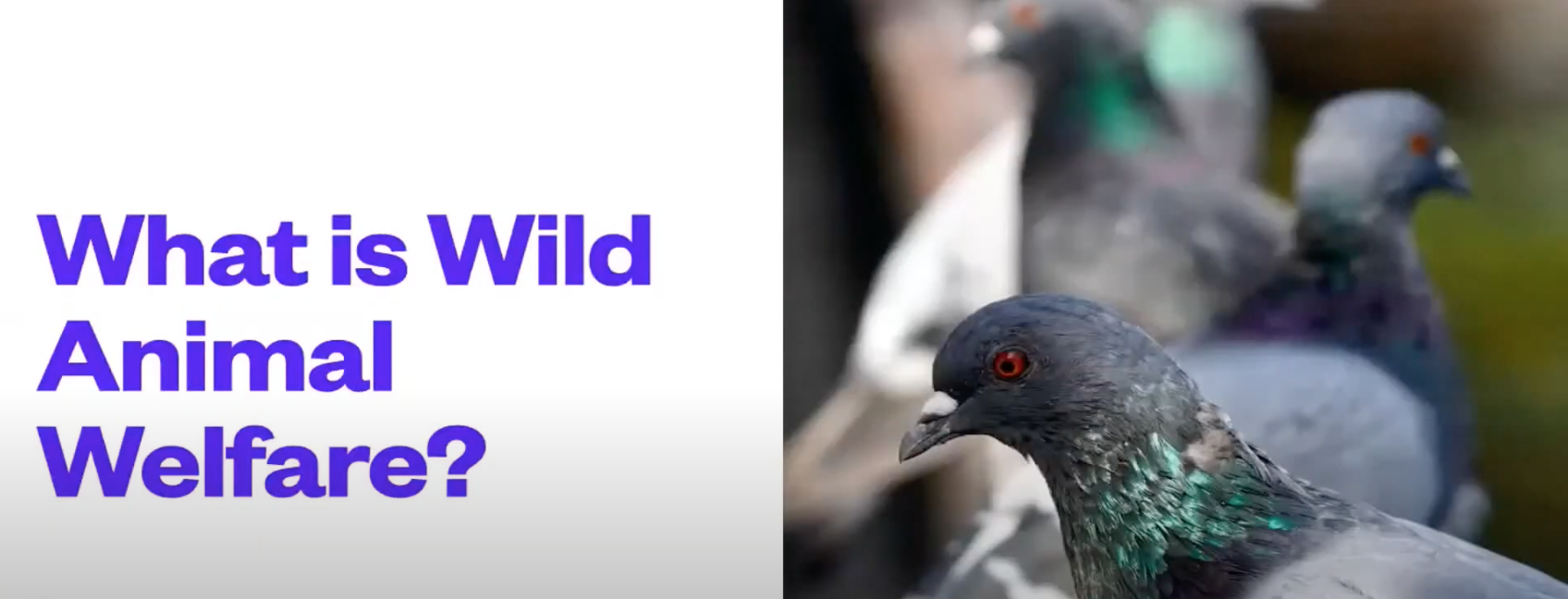
Wild Animal Initiative and organizations like ours work to improve the lives of animals living in the wild.
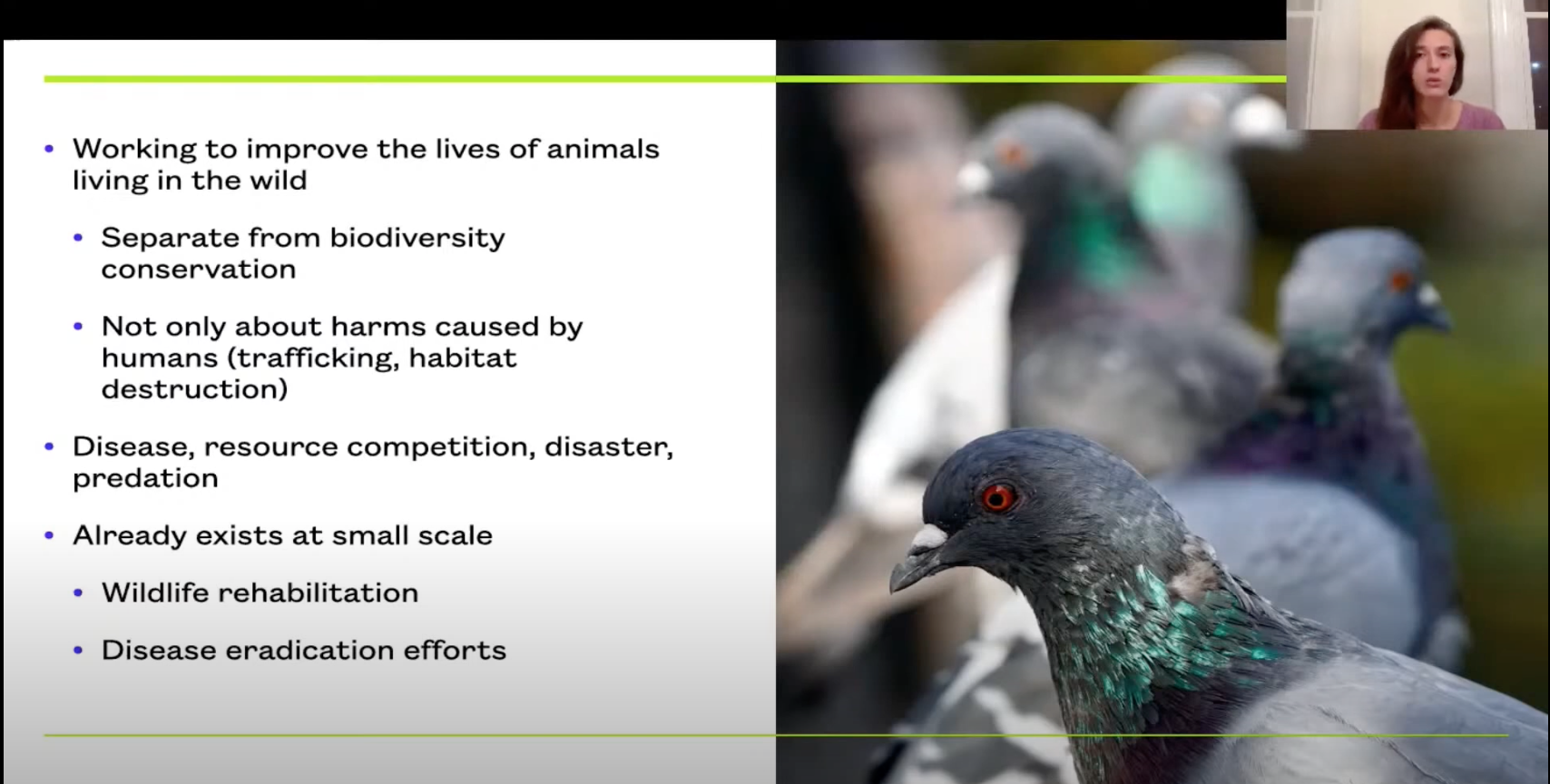
This is separate from biodiversity conservation. Put very simply, biodiversity conservation focuses on preserving the number and diversity of different animal species, whereas wild animal welfare work focuses on improving the quality of life of all species. Our work is not only focused on harms caused by humans, which might include things like wildlife trafficking or habitat destruction, but also causes of suffering that might be perfectly natural, such as disease or resource competition, disasters like forest fires, or predation.
Work that is focused on the welfare of individual wild animals already exists on a small scale outside the effective altruism (EA) community. For example, wildlife rehabilitation often occurs in cities or other areas where people bring in injured or impaired wildlife for medical care.
Also, large-scale efforts have occurred, although they haven’t primarily [focused on] improving wild animal welfare. For example, attempts to eradicate the screwworm in Central and North America were undertaken to improve outcomes for cattle farmers, but may also have improved the welfare of wild animals who no longer have to suffer from a very painful parasite.
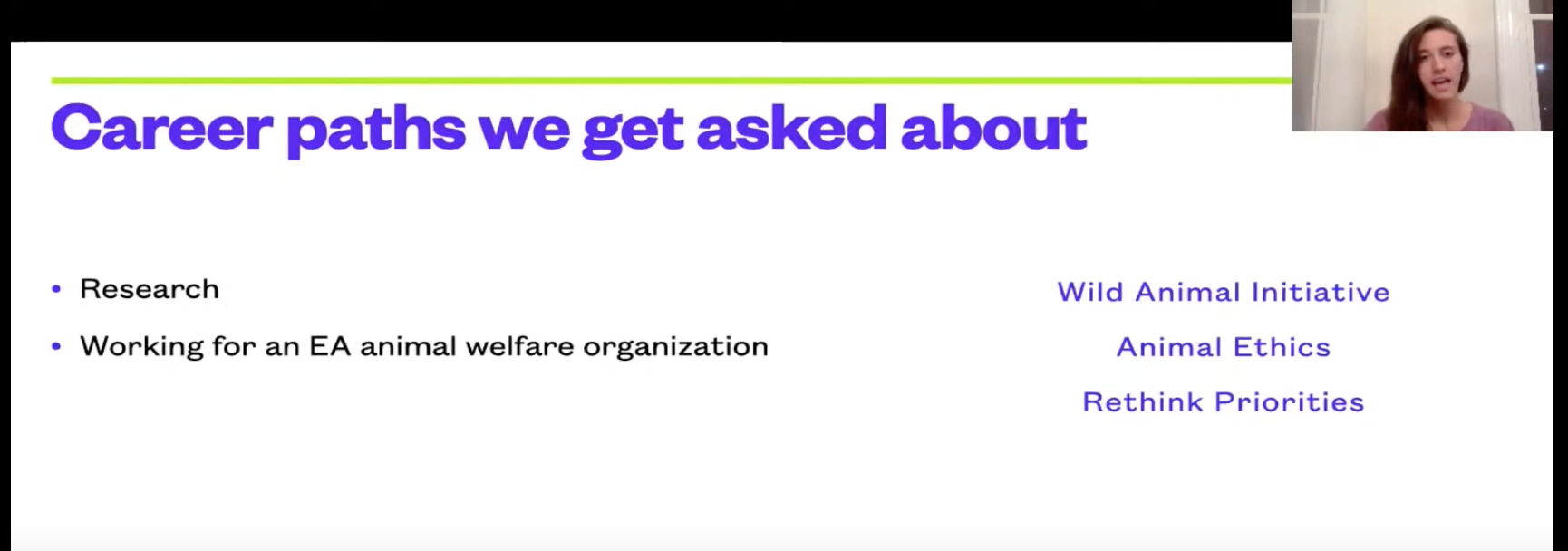
At Wild Animal Initiative, we often get asked about career paths in research and working directly for EA animal welfare organizations. I'll let Oscar talk a little bit more about the variety of research paths, particularly within academia, that are relevant to wild animal welfare. But in terms of working at EA animal welfare organizations, there are only a few organizations — such as Wild Animal Initiative, Animal Ethics, and Rethink Priorities — that work on wild animal welfare using an EA priority set.
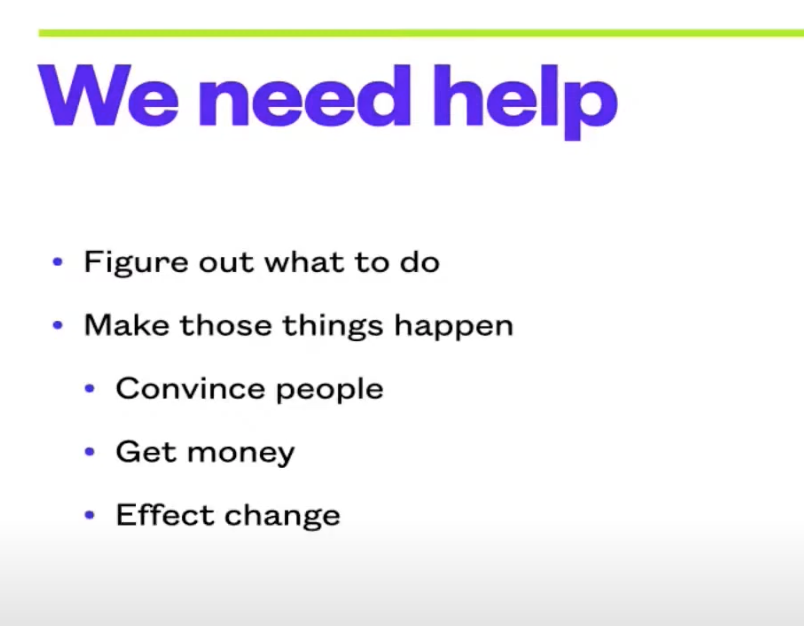
I want to emphasize that working in an adjacent community may be just as impactful for ultimately accomplishing wild animal welfare goals. The bottom line is that we need help. Three organizations and the level of funding that we receive from within the EA community is not enough to accomplish the major goals of wild animal welfare.
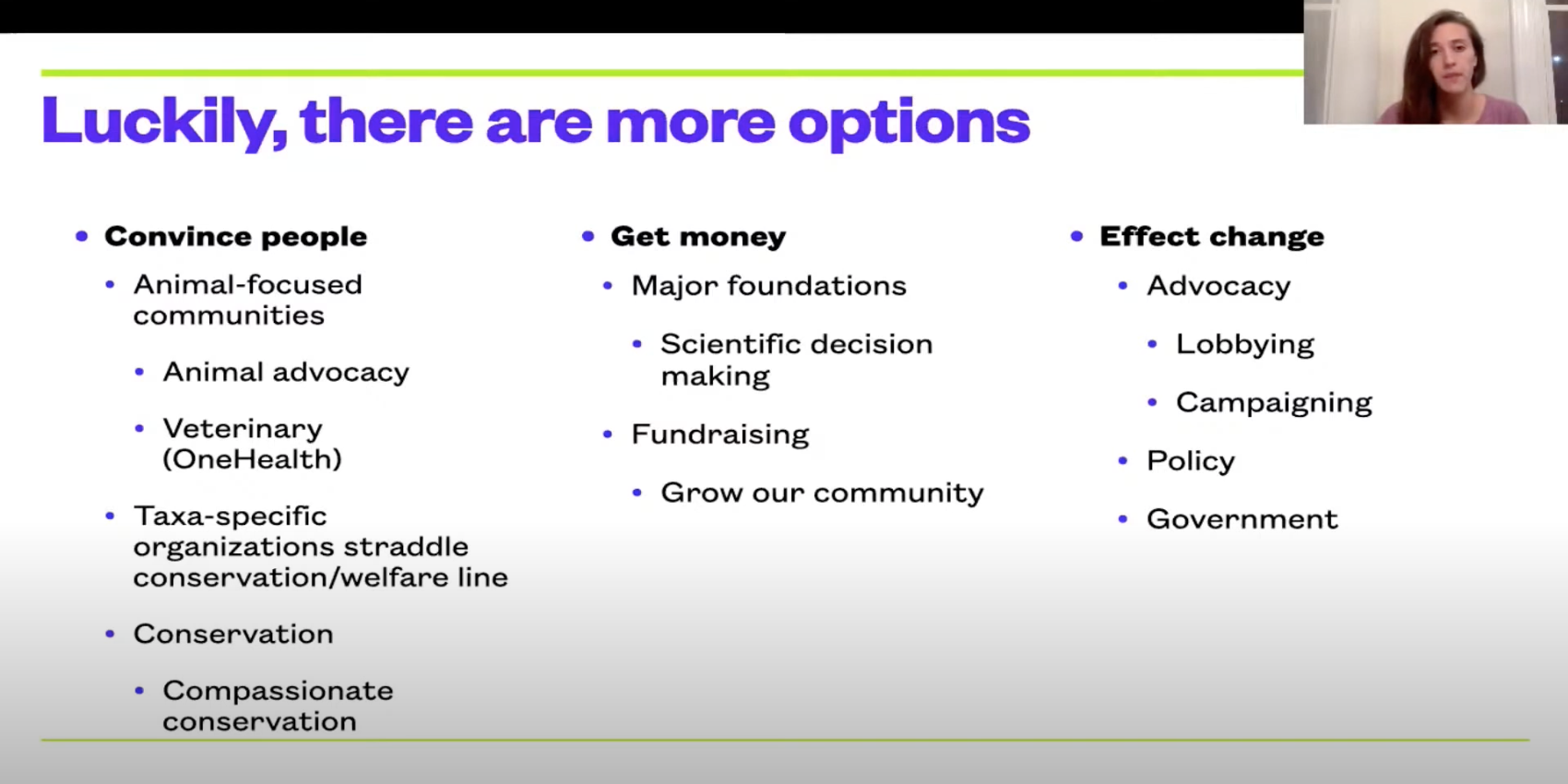
In terms of the research that's getting done, much of it is focused on figuring out what to do to help wild animals. But once we figure those things out, we actually have to make them happen by:
- Convincing people that our goals are good ones, and that our approach is correct
- Getting money to accomplish our goals
- Effecting change in terms of outcomes for wild animals
Communities that are adjacent to the wild animal welfare community may have a lot of impact in helping us accomplish these three things.
Animal-focused communities like the animal advocacy community or the veterinary community — particularly within the American Veterinary Medical Association’s One Health paradigm — stand in a really good place to advocate for a consideration of the welfare of wild animals and implement public health policies that might improve wild animal welfare.
Taxa-specific organizations that straddle the line between conservation and welfare also exist. For example, the American Bird Conservancy does not think of itself as a wild animal welfare organization, but recently their work helped pass a bill in New York City mandating that all new buildings use bird-safe glass. This seems very likely to reduce the rate of injury suffered by wild birds colliding into buildings.
I took pains to distinguish the community of conservation from that of wild animal welfare. Yet there are still many people within conservation who care very deeply about the welfare of wild animals, and they may be interested in advancing wild animal welfare goals in tandem with conservation goals. The compassionate conservation community is particularly interested in integrating animal welfare and conservation efforts.
Now let’s focus on the question of getting money. Roles at major foundations like the National Science Foundation and the National Institutes of Health — and [other organizations] where you have some scientific decision-making power over where money gets allocated — are valuable positions for helping direct more funding to wild animal welfare research projects. And any fundraising effort in general can be important for growing our community, especially [those that involve] working with animal-focused communities on wild animal projects.
In terms of effecting change, advocacy of all kinds that can convince the people who control our interactions with wild animals — or [influence] the industries or land-use changes that affect wild animals — is incredibly important. This could involve things like lobbying to change decisions within government or campaigning to convince the public of the value of particular ballot initiatives that might affect wild animal welfare.
You could also aim to become a policymaker yourself and help move forward policy decisions that are going to benefit wild animals, or work within government to implement those policy decisions. For example, in the US, the Fish and Wildlife Service regularly makes decisions about the management of public lands that seem very likely to impact the welfare of animals living on those lands.
So far, I’ve focused on career pathways and communities that are relevant. But you might be thinking, “As a student, what can I be doing now?”
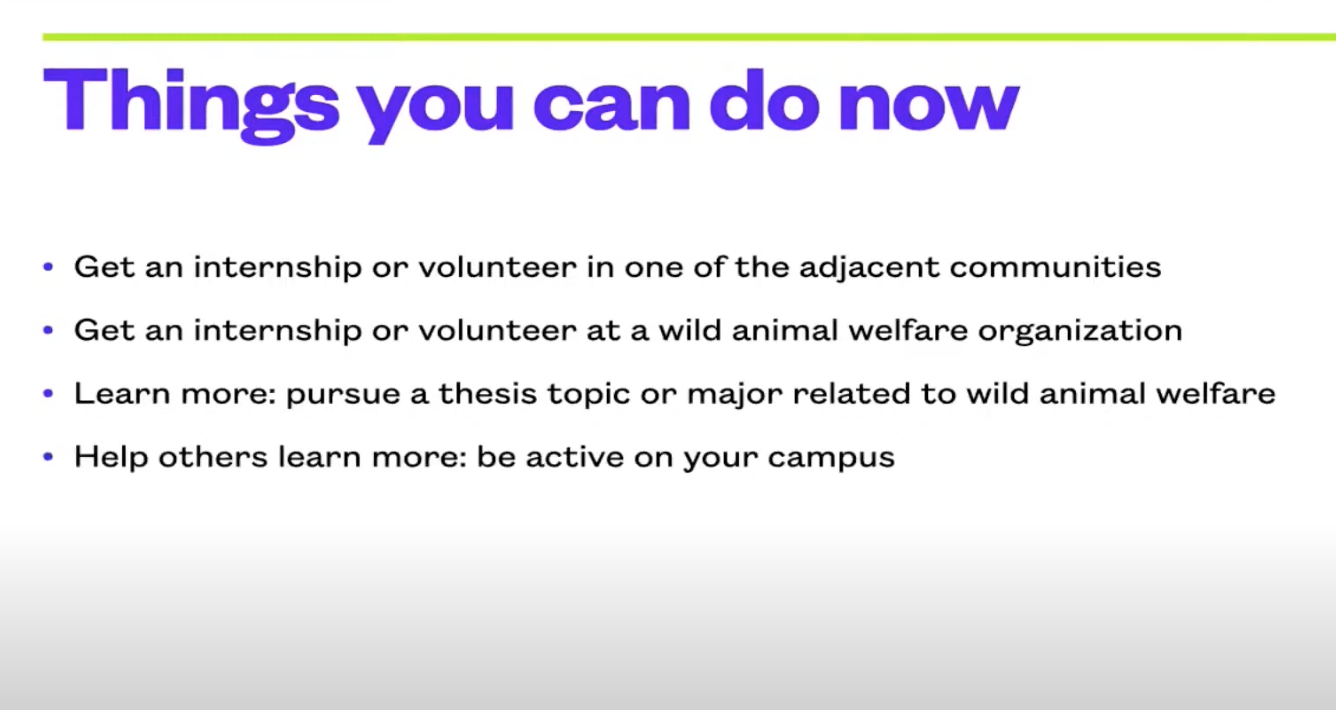
Some things that you might undertake immediately could be:
- Getting an internship or volunteering in one of these adjacent communities. Not only will this give you career experience, it will also help us understand how these communities perceive and talk about wild animal welfare, and how we might work best with them in the future.
- Interning or volunteering at a wild animal welfare organization. However, as I mentioned, there are not that many [of these opportunities] right now.
- Learning more by pursuing a thesis topic or a major related to wild animal welfare.
- Helping others learn more by being active on your campus.
Focusing specifically on that last bullet point, I encourage people who are interested to get in touch with me about a new initiative.
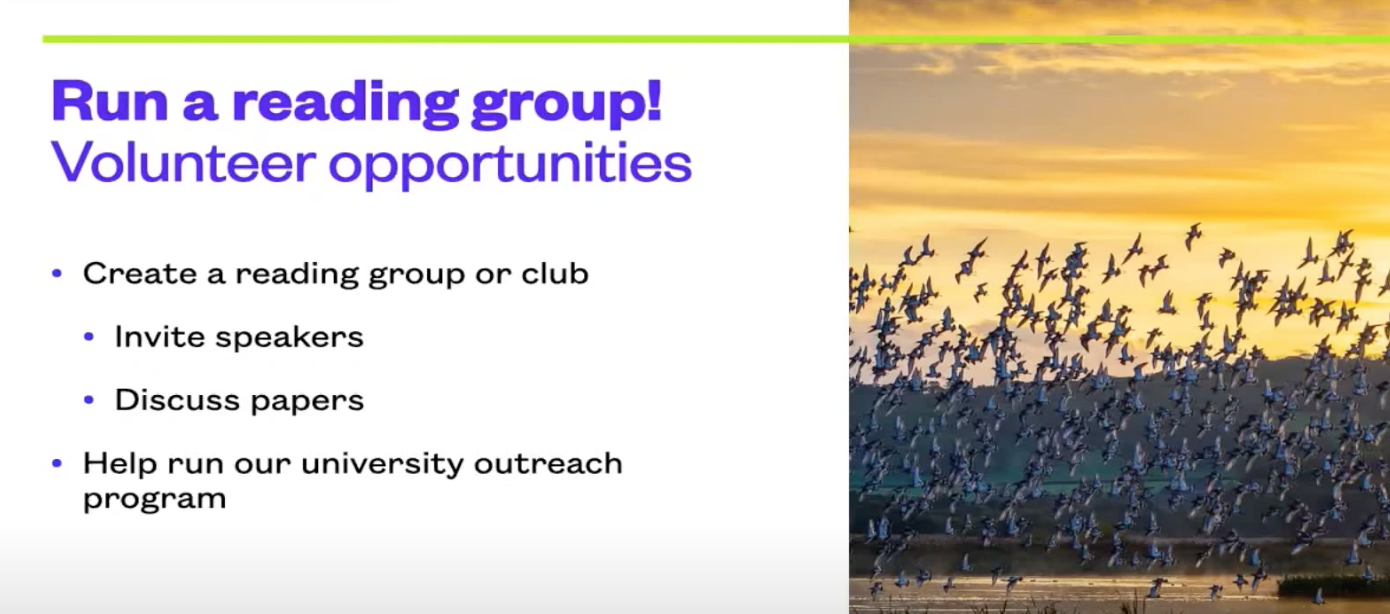
Wild Animal Initiative is starting to run reading groups on a variety of campuses worldwide. We’re thinking of something like a journal club or a seminar series, where we might invite speakers who are knowledgeable on wild animal welfare topics, or discuss papers related to our work.
We can help you start such a group or come up with content ideas for what to do with such a group. And if you're really motivated, we're also looking for a volunteer to help run our overall university outreach program.
If you're interested in any of the ideas I've brought up today, or in volunteering in a capacity that I've just described, I encourage you to reach out to me or to go to our website to learn more. Thank you.
Oscar's talk
Sofia: We'll now hear from Oscar Horta. Oscar has been involved in animal advocacy since the 1990s and is a founding member of Animal Ethics. He teaches moral philosophy at the University of Santiago de Compostela, and previously worked as a researcher at the Spanish Foundation for Science and Technology. Here's Oscar.
Oscar: Hi. Thanks for attending this talk. I'm Oscar. And I am a member of Animal Ethics and also a professor at the University of Santiago de Compostela. I'm going to be speaking about how to promote research on helping wild animals.
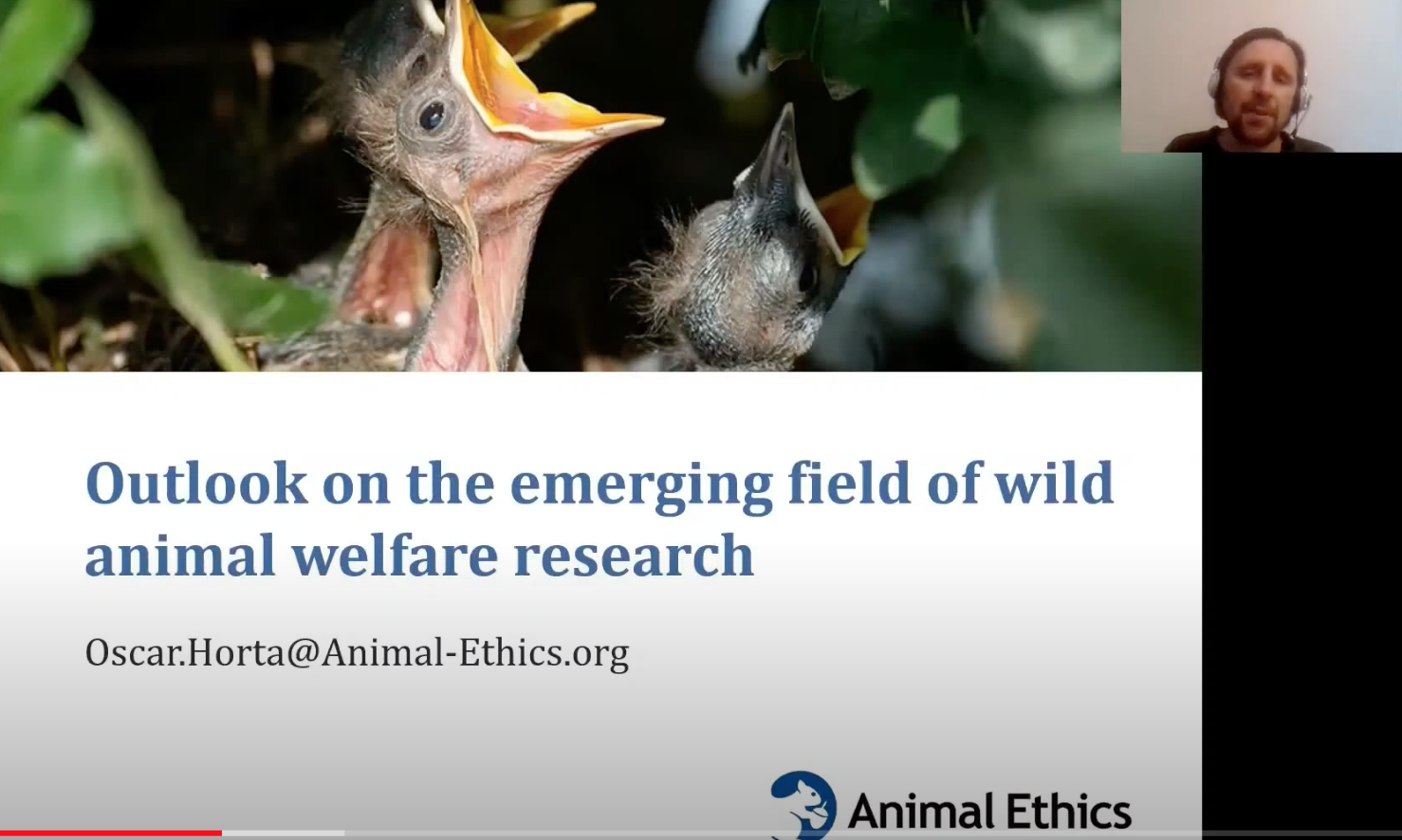
This is a very neglected and grossly underfunded area; there are very few people working on it, despite the fact that some estimates indicate the majority of wild animals suffer very significantly, for a number of reasons. Suffering may prevail over positive well-being in their lives.
It's true that there have always been people who have been concerned about this, and [who have been pursuing various] ways to help wild animals — in some cases, for decades. But as an area that has been grossly neglected and is recognized as still very new, wild animal welfare needs a carefully planned strategic course of action.
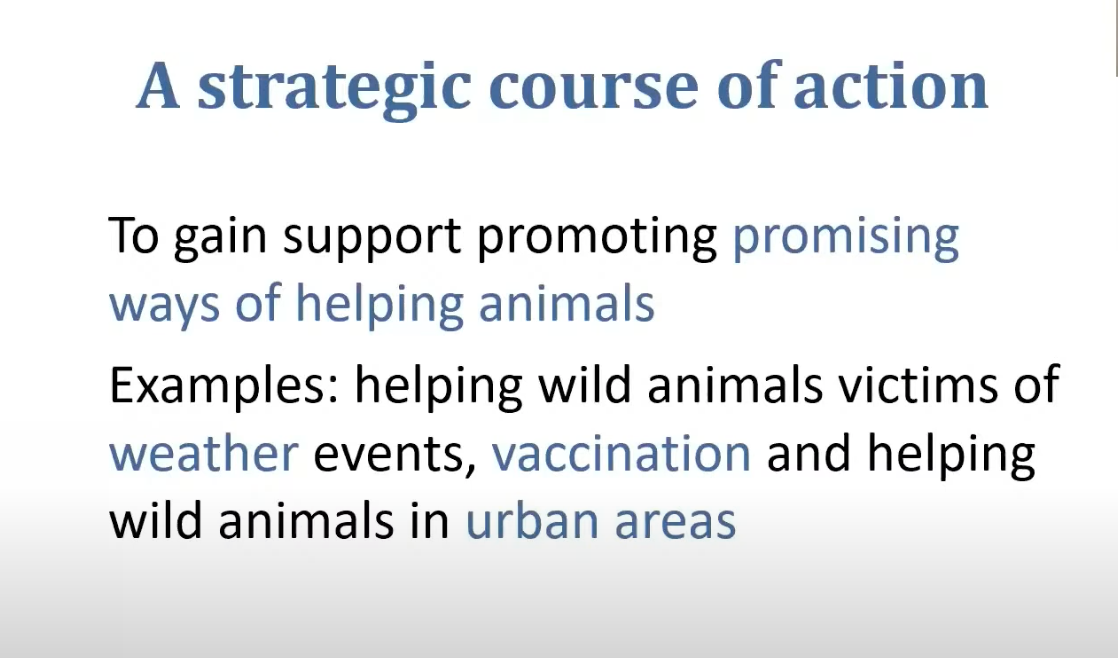
Therefore, we should be distinguishing between ways of helping animals that could reduce their suffering the most under ideal conditions, and those that are more convenient right now and have more potential to develop the field. Animal Ethics has been researching this. We’ve found that there are certain ways of helping animals that are non-controversial and likely to be accepted by scientists (and probably by the general public), and that we therefore recommend. These include helping wild animals victimized by weather events, vaccinating wild animals against certain diseases, and helping wild animals in urban areas.
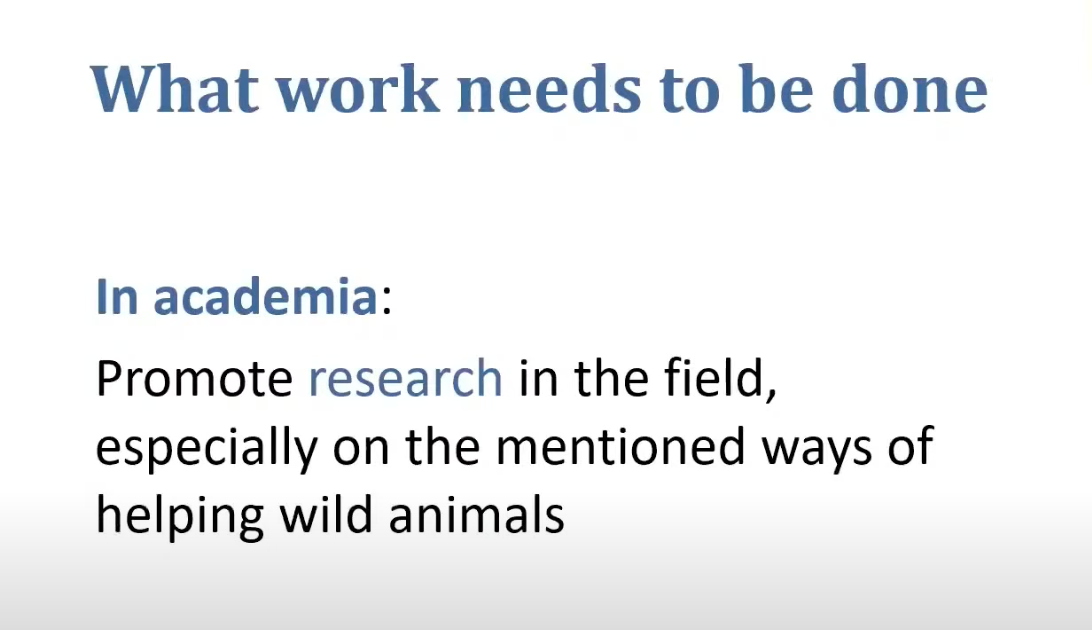
In academia, we should certainly promote that there's more research to be done. And when we consider animal advocates in the effective altruism movement, we should provide them with more education and clarify the many [points of] confusion that still exist. We should also work to obtain more [financial] support; as long as this field continues to be severely underfunded, it's going to remain difficult to make significant progress.
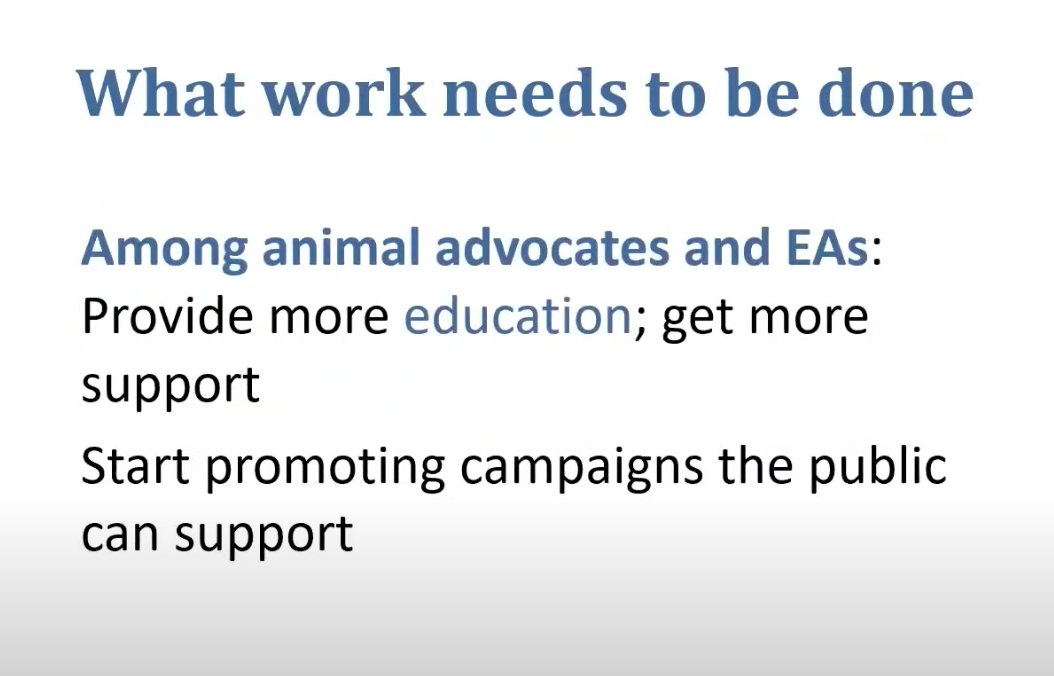
And then, at some point, we can start promoting actual campaigns that animal advocates and the general public can be sympathetic toward.
What can students do about this?
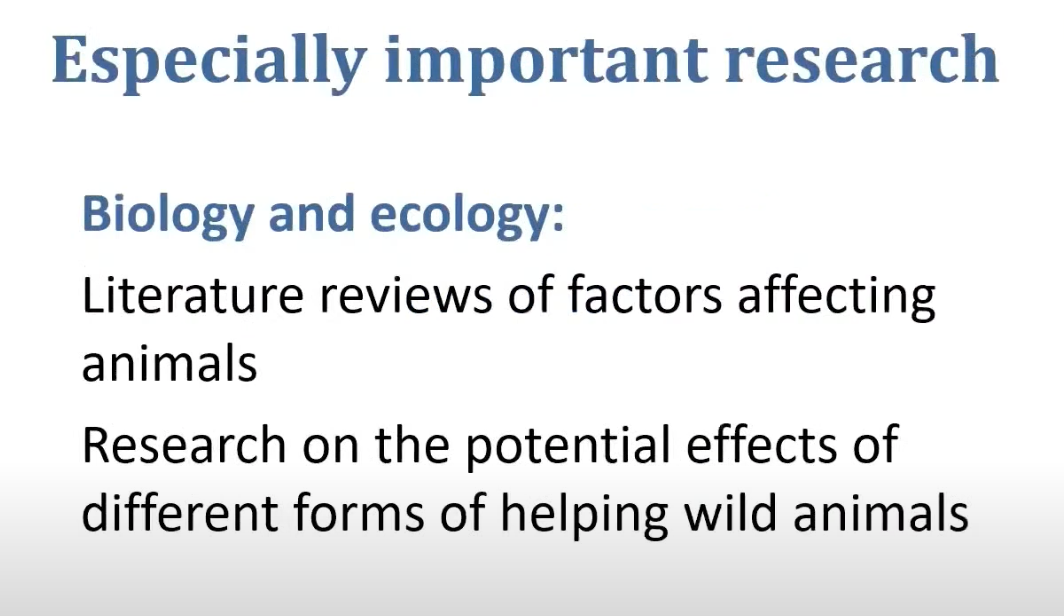
First, you can consider researching the causes of wild animal suffering. For instance, you may need to decide what topic to write your dissertation on. If you’re a student in biology or ecology, there are different topics you could research. [You might conduct] a literature review about how different factors affect the well-being of animals in different ecosystems, or explore the potential effects of different forms of helping wild animals (i.e., do research in ecology with a wild animal welfare focus).
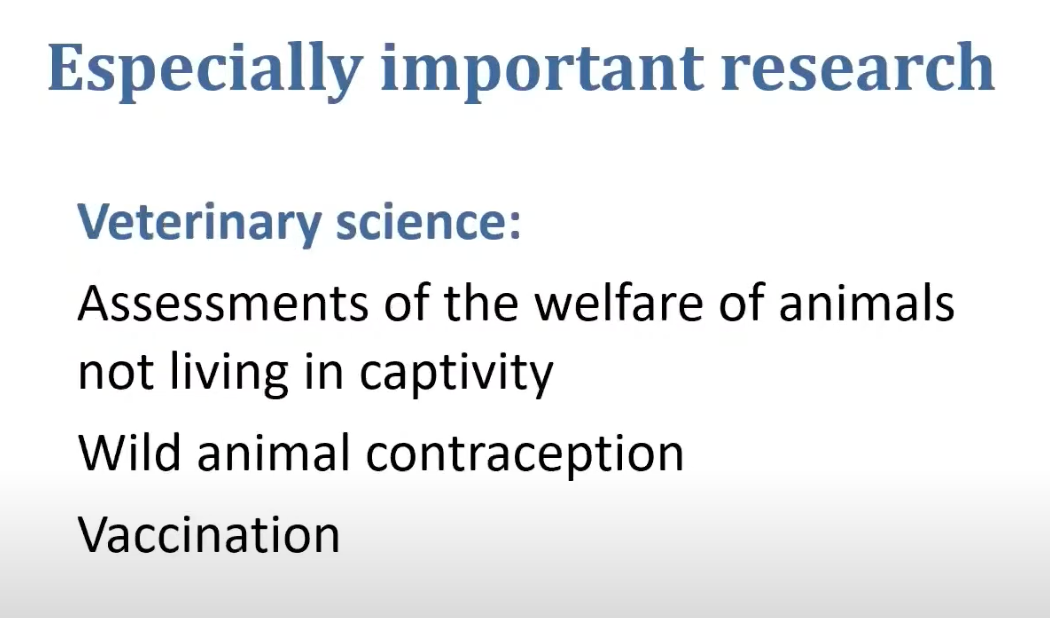
Students in the area of veterinary science also could make a great contribution. You could work on expanding veterinary science to include animals that don't live in captivity. For example, you might do an assessment of the welfare of animals not living under direct human control, work to improve ways to handle wild animals without causing them harm, or work on wild animal contraception, vaccination, or other related areas.
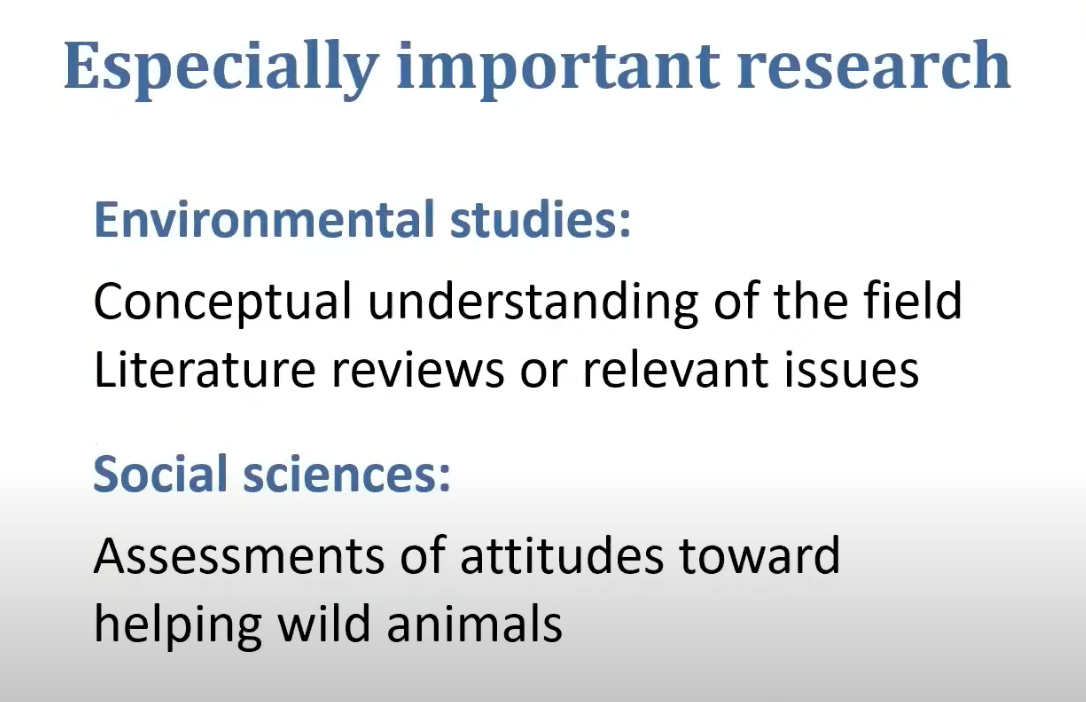
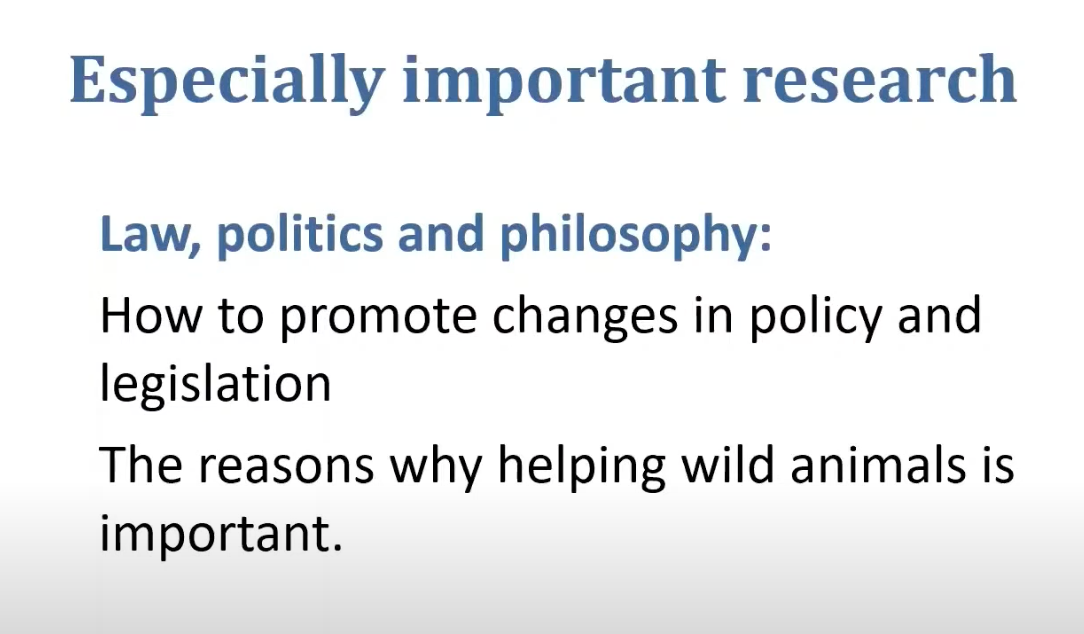
Others can also help — for example:
- Environmental studies students could help to provide a better understanding of the field and conduct literature reviews on relevant issues.
- Students working in the social sciences can conduct research assessing the attitudes that people in different relevant groups — the general public, people working in science, and animal advocates — have towards different ways of helping wild animals.
- Students working in law and politics can do research on how to best promote changes in legislation and policy.
- Students working in philosophy can work on further developing the case for helping wild animals.
There may also be students in other fields who can make important contributions. We encourage them to get in touch with Animal Ethics for research ideas.
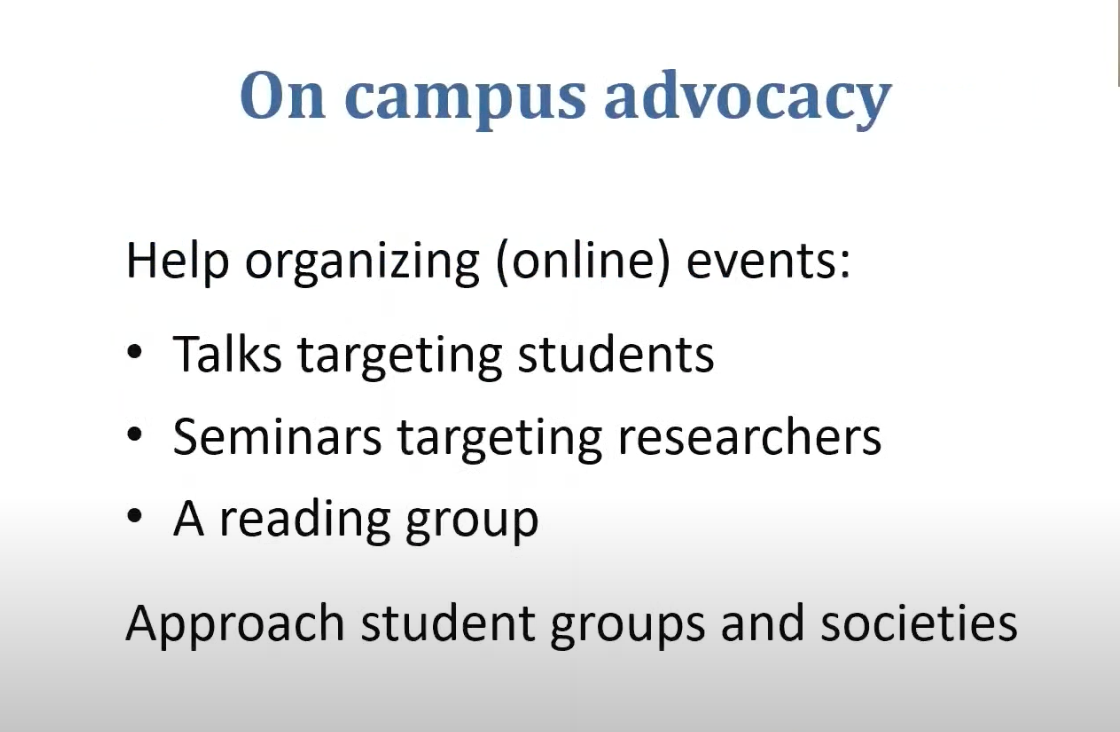
Students are in a privileged position to encourage more interest in the field. You could help organize events — for example, online talks targeting students, or seminars targeting researchers and maybe professors. You could organize reading groups about the field. And you could get in touch with groups of students and student societies.
So, there are many things that can be done about this. If you want more ideas, you can get in touch with me. You have my email. Or you can just contact Animal Ethics. Thanks for your attention.
Q&A
Sofia: Thank you for those talks, Michelle and Oscar. I'd love to jump right into some questions.
Michelle — in your talk, you outlined some possible relationships that we might be able to have with other communities. But there wasn't much time to get it into what you've already done. Could you broadly talk about what Wild Animal Initiative is working on now and has done in the past? And then, more specifically, could you [cover] some things that you've done to coordinate and collaborate with other communities?
Michelle: Yeah, definitely. On the topic of what we've done so far and what our focuses are, we do both research and outreach at Wild Animal Initiative. Our core goal is to start more conversations and research projects about wild animal welfare among researchers, and to direct industry and scientific funding from outside the EA community toward wild animal welfare research projects.
We do some research ourselves. Our research team chooses projects on both the basis of how impactful they might be for wild animal welfare and their messaging value (i.e., how likely it is that we'll be able to publish the findings in an academic journal or start a conversation among other academics). Other initiatives or activities on that front include our advisory panel, which improves the quality of our in-house research and also brings academics from a variety of fields to the conversation about wild animal welfare.
Some of the research we're focusing on right now includes a pigeon fertility control project. That's a collaboration between us and a researcher at Virginia Tech who's an expert in bird stress physiology. We're also looking into cause-specific mortality and understanding where the gaps in our knowledge are. There's a lot more detail on our website than I have time for now, but we’re involved in a variety of research projects with those goals in mind.
In terms of reaching out to other communities, I've connected with people in the conservation space and the veterinary space. We're in the early stages of understanding which communities are most likely to have value and be willing to work with us. But I've been pleasantly surprised by the extent to which a lot of the people I’ve spoken with who [are involved in], say, conservation ethics have been interested in the ideas that wild animal welfare brings up — and who have wanted to talk about them.
Sofia: That's great. To follow up, I think you did such a good job of outlining all of the possibilities that it might seem like [animal welfare is] just a massive space. That may be somewhat overwhelming to some audience members. How would you suggest that people think about where to focus their energies — how might they narrow it down and select an angle from which they can help wild animals?
Michelle: Yeah. I think a lot of this has to do with personal fit, because you're probably not going to make the largest contribution in a space that makes you unhappy. So I definitely recommend thinking about what works for you.
Some of the things that are maybe most promising [involve] working in the overlap between wild animals and human policy — any area where humans are taking action to affect animals already, and that could be adjusted to be more humane. That's the low-hanging fruit; those might be areas where we can make a big difference with small changes.
[This also applies to] researching public policy — for example, researching fertility control in order to understand how it can be used for wild animal welfare, or thinking about working in the local government that might make those decisions.
Sofia: Fantastic. Thanks.
Oscar, I'd love to hear from you as well and get an overview of what Animal Ethics is working on. What are some interesting projects? And what do you have in mind for the future?
And then I'd love [for you to address a] really great audience question about tractability: What do you think the tractability of those initiatives and programs is, given that we're in a space where [tractability] feels like it’s still an open question?
Oscar: Right, thank you.
Animal Ethics doesn't work only on wild animal suffering. Our approach to animal advocacy is very much focused on things like challenging speciesism and taking a long-term [perspective], which we think is lacking.
But most of our efforts are focused on wild animals. And we've done basically two kinds of things. First, we've done educational work. We’ve produced a lot of texts that are meant to be introductions to the issue, where we tackle different ways in which animals are harmed in the wild, why this matters, and the ways in which we could help them (and already are helping them). Perhaps the most interesting material we've published so far is our video course, which is available on YouTube and on our website. It covers the field in 28 different videos and comes with a companion ebook of more than 200 pages that summarizes what we see as the basics. It's called Introduction to wild animal suffering: A guide to the issues.
And then [in terms of] research, we've been focusing — along with Wild Animal Initiative — on developing academic work in this field. We’ve done work in three main areas:
- Research of our own. We're also working on contraception, although we are focusing on large birds.
- Partnerships with people in relevant [areas who] have been working on wild animal welfare and biology. For instance, we've been working with a department at a university in New Zealand that does research on siltation and how to assess the welfare of marine mammals. We’re interested not only in how these animals could be helped, but also to use this [topic] to introduce new concepts and ways of assessing the field. We have done this with other universities as well.
- Examining — through interviews and a survey — how academics could be interested in this issue. What are the ways of helping animals that seem promising in terms of provoking more research? We have found that there are three especially promising fields: helping wild animals that are the victims of extreme weather events, [running] wild animal vaccination programs, and helping wild animals in urban environments or other areas severely affected by human action.
These efforts show that the field is definitely a tractable one, because in many cases, the interventions are not new. They have been [practiced] for decades already — for instance, in the case of vaccination. And as Michelle mentioned before, often they connect with policies that are already carried out for other reasons, but happen to help wild animals too. We believe that in the future, with more research, these kinds of interventions could be expanded. And there are other ways of helping animals that just need more research to back them up and get the interest of policymakers.
Therefore, we believe that we should definitely avoid the idea that [efforts to reduce] wild animal suffering are related to science-fiction scenarios that are far from our reality right now. This is basically what I have to say about tractability.
Sofia: Fantastic. We also have an audience question about funding. So, one of you mentioned that there are some funding limitations in the wild animal welfare space. And we have an audience member who's wondering what extra funding would accomplish on the margins.
Michelle, maybe you can start.
Michelle: Sure. I can only speak for Wild Animal Initiative, but if we had more money, we could hire more people. If we could hire more people, we could do more activities. That's the short answer. But in terms of very specific programs, I think Wild Animal Initiative would love to run a fellowship program, create more connections, and do more direct outreach. And I see we're running low on time, so I won't say too much more. But I have a whole plan.
Sofia: Fantastic. Oscar, do you want to chime in?
Oscar: I would just back up what Michelle said. The same [is true for] us. We are severely underfunded. We have a lot of ideas. But we're definitely underfunded. The field is severely neglected, so this can be a very good use of your donations.
Sofia: Great. And I think your earlier comments about tractability really helped [enhance our] understanding of how extra funding can help. There are a lot of great applications.
I just want to thank you both. This was really fantastic. We're running out of time, but these were great talks and I really enjoyed the conversation. And I'm glad you were both here. Thanks for joining us.
Oscar: Thank you.
Michelle: Thank you.
Sofia: And to everyone out there, thanks for watching.
Barb Noon @ 2021-09-19T23:48 (+4)
Rewilding is getting some support as a means to draw carbon down. I am all for rewilding areas; however, I have in mind letting nature run its course without humans introducing any particular animals. I see in many writings about rewilding the idea of introducing carnivores as being paramount to keeping the "balance of nature" intact. In fact, I've seen vegans (I am an 11-1/2 year vegan) who highly and almost viciously criticize other vegans who want to have a more peaceful wilderness with fewer carnivores and population control by more peaceful means. They seem to think there has to be a strong predator force because that's "how it was intended in nature."
Do you have talks on this subject? I feel like it would be the time to come out and try to influence how rewilding happens, instead of staying quiet and letting them introduce large carnivores, and hence, more animal suffering.
Since we have the chance to help create habitats, I would like to create them to be more peaceful. Perhaps I am one of the few who think this way.
Barb Noon